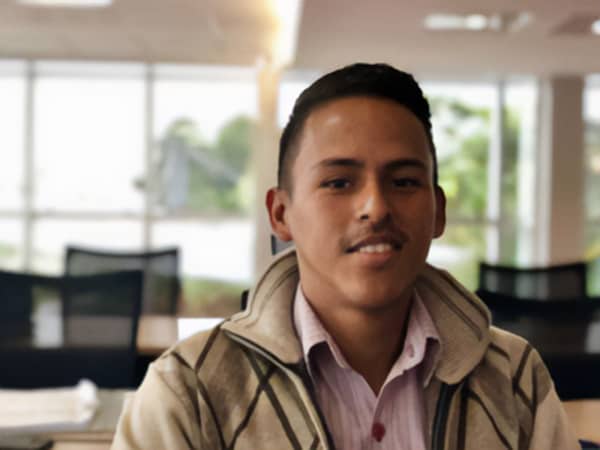
Venezuelan Migrant Beneficiary Turned ADRA Employee
Carlos is truly a renaissance man. In his native Venezuela, Carlos studied and graduated from university with a degree in communication, worked as a tailor, volunteered as a sign language interpreter, and formed part of a cultural dance group.
Carlos led an active life alongside his parents and siblings. His father owned a small glass factory in Venezuela which had provided for his family for many years; however, with the worsening of the crisis in Venezuela and the devaluation of its currency, the factory was no longer enough.
All three of Carlos’ siblings and mother had to look for whatever work they could find. The family brought their earnings together to try and survive, but surviving is something difficult to do these days.
Carlos describes the choices they have in Venezuela:
1. Stay in Venezuela and starve
2. Stay in Venezuela and run the risk of one day getting sick in a place where adequate healthcare no longer exists
3. Stay in Venezuela and run the risk of being killed in the streets one day because of the rising of insecurity
This dire situation led Carlos to make a difficult decision. In November 2017, he decided that he would make his way to neighboring Brazil and try his luck. After much planning and lots of hard work, Carlos was finally able to travel to Brazil in August 2018 by bus.
During the first month in the new country, Carlos found himself living on the streets with little hope of a better situation. However, his luck changed one day when he met a Venezuelan couple who knew about ADRA. The couple took Carlos by the hand and brought him to ADRA’s office where the Project Manager for Office of Foreign Disaster Assistance (OFDA) funded intervention and was able to find Carlos space in one of the Boa Vista shelters, a shelter that the Brazilian government has opened in response to the migratory crisis.
At this time, Carlos had found a job making military uniforms, but the pay wasn’t enough for him to live. After his encounter with ADRA staff and having procured a spot in one of the shelters, he decided to quit his job and volunteer his time to ADRA.
Carlos said that, “I was working so much for so little. So I decided that I would rather work hard for nothing just to have the opportunity to help others and feel more fulfilled.” He worked tirelessly every day to help assemble and distribute hygiene kits, domestic kits, and kitchen kits to his Venezuelan brothers and sisters. As luck would have it, Carlos also qualified to be a beneficiary himself.
Now that ADRA is beginning a new U.S. government funded project with the office of Food for Peace (FFP), he has been hired by ADRA as a Field Officer. Not only will Carlos be working ADRA, but he’ll be serving his own community. He has also expressed that he’ll be using his abilities in sign language to help ADRA reach vulnerable groups that can be easily overlooked.
Carlos declares that his encounter with ADRA has changed his life in the best and most unimaginable way possible. He is forever grateful for this new-found chance at more than just survival—he is grateful for a new chance to live.